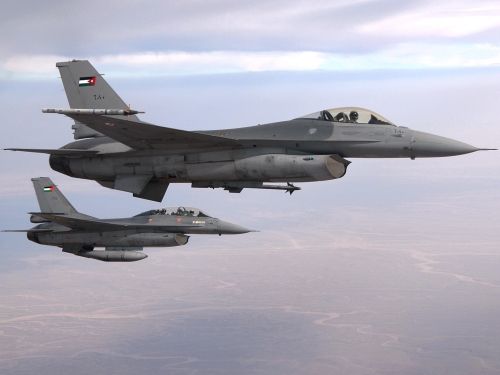
This article was originally published by World Affairs on 12 February, 2015.
Following the gruesome murder of First Lieutenant Moaz al-Kasasbeh, Jordan has reportedly launched more than 50 airstrikes in three days in Syria, marking a dramatic increase in its direct military action against the Islamic State, also known as ISIS or ISIL. King Abdullah II has said his nation will continue to fight ISIS until it runs out of “fuel and bullets.”
Jordan’s decision to avenge the death of its airman has now become central to the debate on how to combat terrorism in the region. Jordan has always been a close ally against extremism; however, the death of Kasasbeh has ushered in a level of direct military engagement as yet unseen from our Arab allies. This heightened engagement from Jordan is exactly what is needed to combat the spread of ISIS in the region.
Since 9/11, Jordan has been arguably the most important Arab ally in the Middle East; through military exchanges, intelligence sharing, and diplomatic support for the US and Israel, Jordan and its charismatic leader have unquestionably and unwaveringly supported US counterterrorism operations and been a part of the coalition in Iraq and Afghanistan. However, its role has traditionally been one of support rather than direct action. This allowed the leadership in Amman to appeal to the vast majority of its population, who support a moderate interpretation of Islam and a free and open society, while also not openly antagonizing those who may privately sympathize with more militant, extreme views.
Abdullah, who is not only Western-educated but also received Western military training, has overseen this delicate balance. The king has continued to liberalize his country by devolving more authority to his popularly elected Parliament, which was first established in 1947.
This forward-thinking approach is exactly the type of leadership that the Levant has been missing in its battle against ISIS. To date, ISIS has grown in numbers and strength in large part because the Iraqi government has failed to secure its territorial integrity and the Assad regime’s tenuous but ruthless grip on Syria. This dichotomy of lawlessness and oppression, along with the marginalization of large segments of the region’s population, has provided fertile ground for ISIS to impose its warped and violent brand of Islamic terror on an unprotected people.
Read the full article here.
Justin Graf is an attorney based in Arlington, Virginia, and a captain in the US Army Reserve. He is also a member of the Truman National Security Project’s Defense Council. The views expressed are his own.
For more information on issues and events that shape our world, please visit ISN Security Watch or browse our resources.

